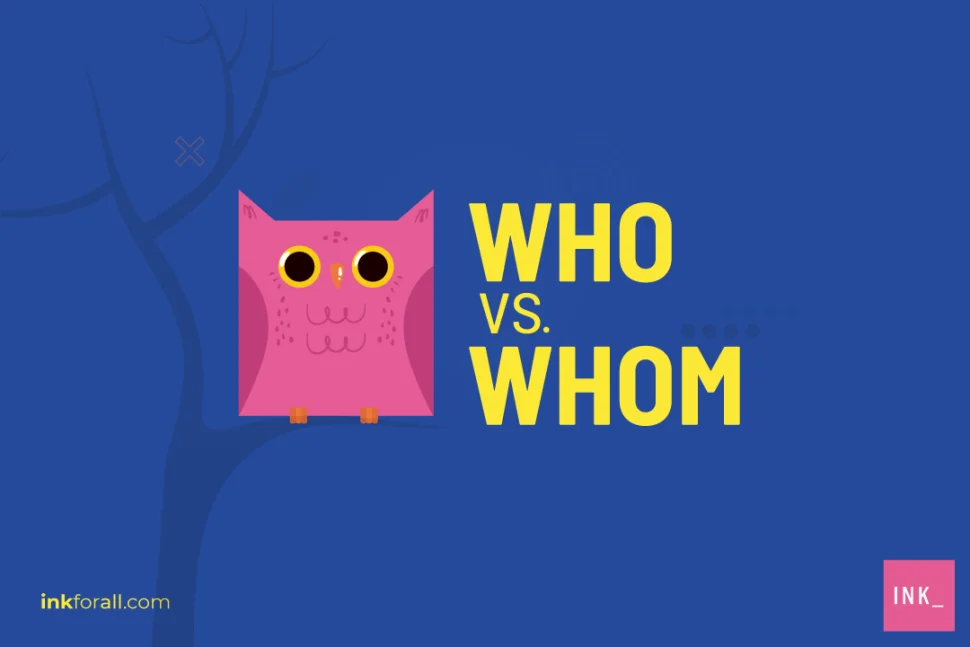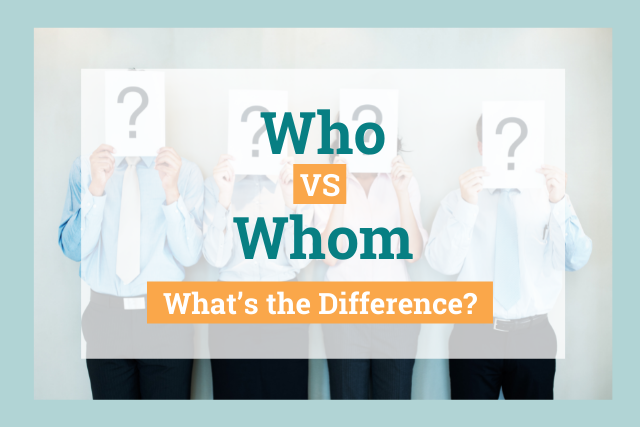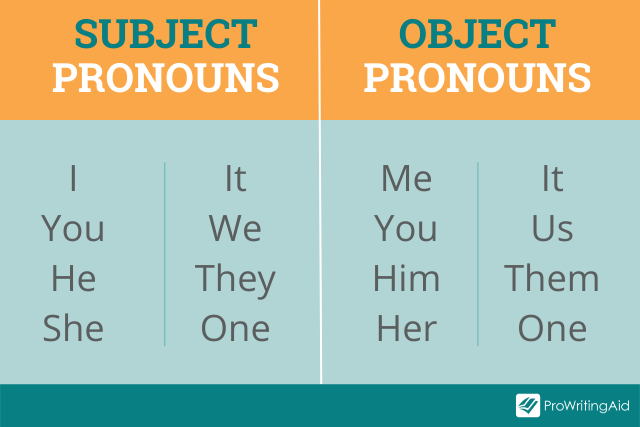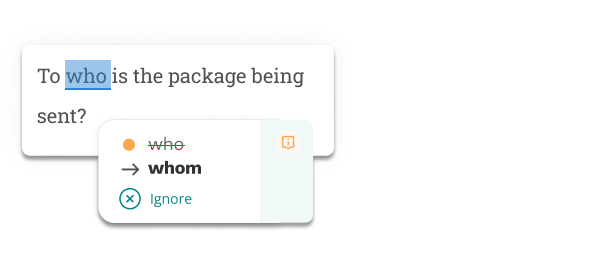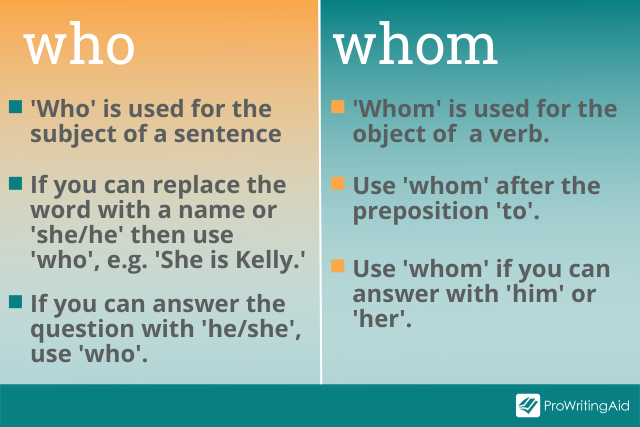A lot of people have trouble on when to use the words who and whom. Mixing these words up can be relatively easy, and, if you confuse them too frequently, it can cause your writing to look sloppy.
So, in this post we’ll talk about the grammatical functions of who vs. whom as well as give you a few tricks to easily determine which word to use and when.
Now, to begin, both who and whom are pronouns, which means they are words used as substitutes for nouns. But even though they are both pronouns, they are used different in a sentence. Let’s take a look at each word.
When to Use Who

- Who ate the pizza?
- He ate the pizza.
In this example, who is acting as the subject of the sentence in the same way that he is.
When to Use Whom
When do you use whom? When whom is used in a sentence, it takes the objective form. That simply means that it acts as an object, either of a verb or preposition. For example,
- You called whom?
- You called him?
- I deliver the pizza to whom?
- I delivered the pizza to him.

In the first set, the word whom is acting as the object of the verb “call.” Whom did you call? I called him. It describes the person you called.
In the second set, the word whom is acting as the object of the preposition “to.” To whom did you deliver the pizza? I delivered the pizza to him. It describes the person to whom you delivered the pizza (to him).
Problem Sentences
Now, determining the case (nominative or objective) of these words can sometimes be tricky because who and whom so often find themselves in the form of a question.
This makes their true function within the sentence hard to see unless you sort the words into a standard subject-verb-object sentence. To help with this, I suggest changing sentences like the following ones into “I should say who is calling?” to make them easier.
- Wrong: Whom should I say is calling?
- Correct: Who should I say is calling?
By changing these sentences into the form “I should say who is calling?” you can more clearly see identify the subject, verb, and object.
Another problem that arises when determining the proper case is when the pronoun serves a function (for example, nominative) in a clause that itself serves a different function (for example, objective) in the main clause.
In situations like these, the pronoun’s function within its own clause determines its case. For example,
- WRONG: Give it to whomever wants it.
- CORRECT: Give it to whoever wants it.
- WRONG: Whoever you choose is fine by me.
- CORRECT: Whomever you choose is fine by me.
In the first example above, the entire clause “whoever wants it” is the object of the preposition “to.” But, in the clause itself, “whoever” serves as the subject, and that function determines the case.
Similarly, in the second sentence “whomever” is the object of “choose” in the clause, so it must be in the objective case even though the clause itself serves as the subject of the sentence.
Tricks to Remember
Now that you know the functions of whom vs. who within a sentence, I can show you an easy trick that can speed up the process of determining their cases.
If you still don’t know when to use who or whom, try simply substituting the words he/him in the clause where the whom or who appears. If “him” sounds better than “he” in the clause, use “whom” because “him” and “whom” both end in and “m” For our above examples,
- Wrong: I should say him is calling.
- Correct: I should say he is calling.
“Him” does not work in this sentence which means that “he” or “who” is the correct choice.
Summary
In short, who and whom have specific functions in a sentence, and it’s important to use each word correctly.
- The word “who” acts as the subject of a sentence.
- Who ate my pizza?
- The word “whom” acts as the object of a verb or preposition.
- Whom are you calling?
- To whom are you talking?
- You can substitute he/him for who/whom if you are having difficulties in determining their function within a sentence.
Contents
- 1 When to Use Who
- 2 When to Use Whom
- 3 Problem Sentences
- 4 Tricks to Remember
- 5 Summary
Who and whom are two words that sound very much alike. However, that similarity just makes when to use who vs. whom all the more confusing.
Main Who vs. Whom Takeaways:
- Who and whom are both pronouns.
- When you’re referring to the subject of the sentence, use who.
- Confirm you’re using the correct pronoun by replacing who with she/he/they.
- When your’re referring to the object, use whom.
- Confirm you’re using the correct pronoun by replacing whom with her/him/them.
- Sometimes you may have to break the who or whom rule to make your content more readable. Or, to prevent awkward and unnatural phrasing.
In this super easy guide, we’ll show you a few simple tricks to remember the difference and use both pronouns like a pro, every time. Also, you’ll see both in action with tons of who vs. whom examples. Don’t forget to test your skills with our quick quiz at the end of this article.
How Do You Use Whom?
You should use whom to refer to the object of a verb or a preposition. Here’s a quick and easy trick to be sure whom is the correct pronoun to use: Replace whom with him or her. If the sentence still makes sentence and is grammatically correct, thenyou know whom is the correct choice.
On the other hand, if he or she sounds better, then you should use who instead. You can remember this trick by associating the “m” in him with the “m” in whom. Another clue is to look for a preposition. For example, whom usually follows a preposition.
How Do You Use Whom in a Sentence?
Here are examples of how to use whom in a sentence:
Remember: The “m” in him goes with the “m” in whom. If you can answer the question with him, then use whom.
What’s the Difference Between Who’s and Whom?
Aside from spelling, who’s and whom have different functions in a sentence. To begin with, who’s is a contraction. Meaning, it’s a two-word term joined together by an apostrophe. It could mean who is or who has. On the other hand, whom is a pronoun and often acts as the object of a verb or preposition.
Here are some examples of how to use who’s in a sentence:
Who vs. Whom: They/Them?
Just like you can use he/him to confirm whether to use who/whom, you can also use they/them. This is because who and whom can represent singular pronouns like he and him as well as plural pronouns like they and them. For plural pronouns, replace who with they. If the sentence is still grammatically correct, then you know that who is the correct pronoun. Conversely, if them sounds better, then you know that whom is the correct pronoun to use.
Remember: If you can replace who or whom with he/she/they, then you should be using who.
Who vs. Whom Example Sentences?
1. Is Many of Whom Correct?
Yes, the phrase many of whomis correct to use whom instead of who. This is because you should use whom to refer to object of a verb or preposition. Since of is a preposition, whomis the correct pronoun to follow it. Another way you can confirm if whom is correct is to replace it with another pronoun like him, her, or them. If the sentence is still grammatically correct, then whom is correct.
2. Who or Whom I Worked With?
The ideal answer is with whom I worked. Whom goes with the object of the verb or preposition in a sentence. Since this phrase contains the preposition with, the most correct way to craft this sentence is using whom. Test if whomis correct by replacing it with him. Does the sentence still make sense? Then whom is the best pronoun to use.
3. Who I Live With or Whom I Live With?
Whom I live with or with whom I live are the correct ways to phrase this. The rule is that who refers to the subject of the sentence while whom refers to object of the verb and or the preposition. Here, we have the preposition with and the verb live. Both of these refer to the person you live with, not the subject of the sentence (I). For this reason, whom is the correct pronoun. Confirm this by rewriting the sentence to use the pronouns him/her/them. If the sentence is still correct, then you know that whom is the correct choice.
4. Who I Admire or Whom I Admire?
Here, the correct answer is whom I admire.This is because we use whom to refer to the object of a preposition or verb. In this phrase, there is no preposition. However, there is a verb: admire. Whom is the object of this verb. In other words, whom receives the action of you admiring. You can confirm that whom is correct because you can replace it with him and the sentence is still grammatically correct.
5. Who I Hate or Whom I Hate?
For this example, whom I hate is the correct phrasing. This is because whom usually refers to the object of a preposition or a verb. We don’t have a preposition in this phrase. But, we do have the verb hate. What’s more, whom is receiving the action of hate. This makes whom the object of the hate.
Since whom is used for the object of a verb, we know that whom is the correct choice here. Confirm this by replacing whom with her or him. If the sentence is still grammatically correct, then whom is the right pronoun to use. If not, then you should use who.
6. Who or Whom Did You See?
Even though you often hear who did you see in everyday conversations, the most grammatically correct answer is whom did you see. Whom refers to the object of the preposition or verb in a sentence. This sentence doesn’t have a preposition, but it does have a verb: see. What’s more, this verb refers to the person you saw (the object), and not you (the subject).
Usually, who refers to the subject. Since whom refers to the object of a verb, it’s the correct pronoun to use in this sentence. One way to confirm this is to rewrite the sentence using him or her. If the sentence is still correct, then you confirm that whom is the correct pronoun.
7. Who or Whom I’ve Never met?
The correct phrasing here is whom I’ve never met. The reason is that whom typically refers to the object of a sentence’s preposition or verb. In other words, whom receives the action.
On the other hand, who usually refers to the subject. This phrase doesn’t feature a preposition, but it does have the verbs have and met. Have is a linking verb, so it’s not showing any action.
However, met is an action verb and is acting on whom. As a result, whom receives the action. The verb met refers to the object (whom) and not the subject (I). Therefore, we know that whom is the correct pronoun. Verify this by rewriting the sentence to substitute whom with she or he.
8. Who We Miss or Whom We Miss?
Whom we miss is correct, not who we miss. Who refers to the subject whilewhom refers to the object of the preposition or verb. We is the subject.
However, the verb miss doesn’t refer to the subject we. Instead, it refers to the person you miss. This means that the person you miss is an object of the verb miss. For this reason, whom is the correct pronoun to refer to the person you miss.
Test this by rewriting the sentences to replace whom with the pronouns him, her, or they. Is the sentence still grammatically correct? If it is, then the correct answer is whom. If it’s not, then you should use who instead.
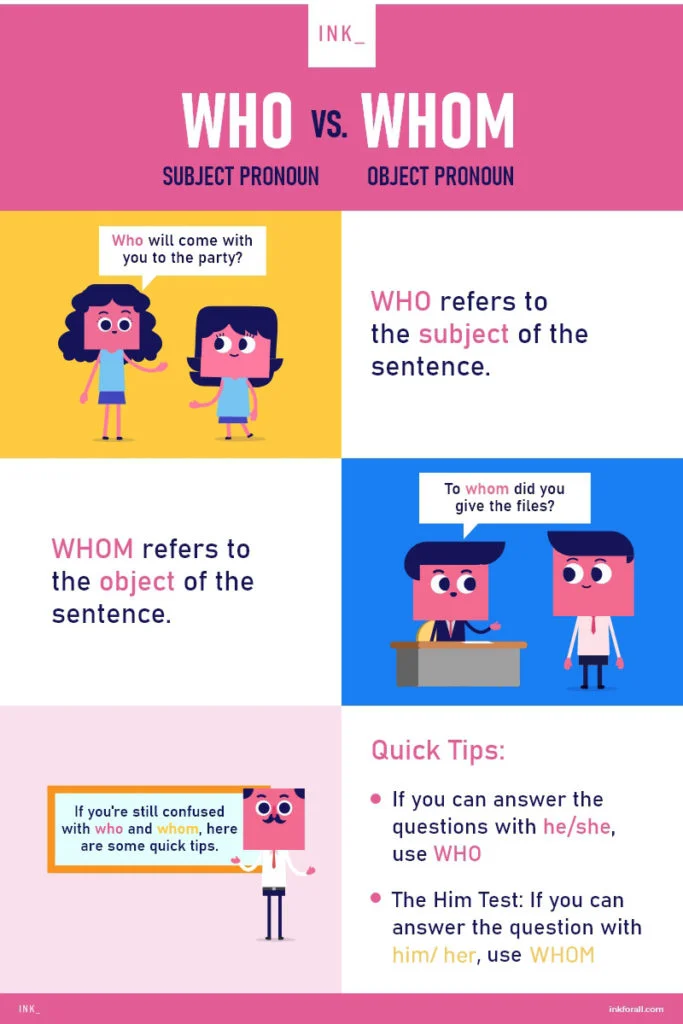
9. Who or Whom I Love so Much?
The correct way to phrase this whom I love so much,not who I love so much. We know that whom is correct because this pronoun refers to the object of a preposition or verb. We may not have a preposition, but we have the verb love. This verb refers to the person being loved (object), and not the I, or the person doing the loving (subject).
Since who refers to the subject while whom refers to the object of the verb, whom is correct. Check that whom is the correct pronoun by rewriting the sentence with him,her, or them. If the sentence is still grammatically correct with one of these other pronouns, then you know whom is correct. However, if he, she, or they fit better, then you know who is correct.
10. Who or Whom Wants Ice Cream?
Who wants ice cream is the correct way to phrase this sentence. The best way to confirm that who is the correct pronoun is to replace it with he/she/they. Does the sentence still make sense? Is it still grammatically correct? If yes, then you know who is correct. If no, then you should use whom.
What’s more, use who to refer to the subject of the sentence. Another way we know that who wants ice cream is correct option is because the subject of the sentence is who.
11. Is it “Who to Ask” or “Whom to Ask”?
The grammatically correct way to phrase this is whom to ask. The phrase to ask really means should I ask. Whenever we need a pronoun that refers to the subject, we use who.
However, when we need one that refers to the object of a preposition or a verb, we use whom. Here, the implied verb shouldrefers to implied subject I. So, now we need a pronoun to go with the verb ask.
Sincewhom refers to the object of the verb and not the subject, we know that whom is the correct pronoun. An easy way to confirm this is to rephrase the sentence using him/her/them. These work as substitutes for whom while he/she/they work for who.
12. Who to Follow or Whom to Follow?
Although the majority of people would probably say who, whom to follow is correct. This is because the phrase to follow actually means should I follow. Therefore, the implied verb should refers to implied subject I.
Since we use who to refer to the subject, we can rule out who. Instead, we use whom to refer to the object of the preposition or verb. Specifically, we need an object for the verb follow. This is why whom is the correct answer.
Easily verify this is by rephrasing the sentence using him/her/them. You can use these pronouns as substitutes for whom and the existence will remain correct. Similarly use he/she/they for who.
13. Who Should you Invite to the Party?
Even though most people would use who, the grammatically correct way to phrase this sentence is Whom should you invite to the party. The trick to know with certainty that the answer is whom is to rephrase the sentence using him/her/them. This is because we use whom to refer to the object of a preposition or verb, and these pronouns can substitute whom.
Conversely, we use who to refer to the subject of the sentence, and he/she/they can substitute who. In this example, the verb shouldrefers to the subject you. However, we need an object for the verb invite. Therefore, whom is the best fit.
Whom: Death of a Pronoun
Many modern grammarians consider whomto be a dying word.
It wouldn’t be the first pronoun to fall out of use, either. Others that have gone before it include thy, thine, ye, and thee. Although they may still show up in religious writing, they’ve fallen out of common use.
Although whom and whomever still have a place in formal writing, they are no longer common in spoken English. Many publications have also ceased using them. Instead, they opt to rephrase sentences to include easier-to-digest pronouns such as him, her, and them.
Who vs. Whom Recap
Who and whom are both pronouns. Depending on your sentence structure, you can easily determine which one to choose.
Ask yourself the following:
- Are you referring to the subject of the sentence? If so, use the pronoun who.
- Is the object of the sentence what you’re referring to? If so, use the pronoun whom.
Here’s a trick that you can use if you get stuck. When deciding on whom vs. who, think of it as him vs he.
- If you can answer the question with “he,” you’ll want to use who—no “m” at the end!
- However, if you can answer the query with “him,” you’ll want to use whom. They both have an “m” at the end!
But wait! What if you’re talking about a lady instead of a gentleman? No worries—we only used “he” or “him” because it makes it easier to highlight the “m” connection. While “whom“or“him” is a quick and memorable mnemonic device, the same idea applies to “she” or “her.”
- If you can answer the question with “she,” you’ll want to use who.
- On the other hand, if the answer to the question is “her,” you’ll want to use whom.
Ready to Dominate This Who vs. Whom Quiz?
Whom Question #1
A. Noun
B. Pronoun
C. Verb
D. Adverb
Correct!
Wrong!
The answer is B. “Whom” is an interrogative pronoun.
Who Question #2
A. The object of the sentence
B. The subject of the sentence
C. The object of the preposition
D. All of the above
Correct!
Wrong!
The answer is B. Use “who” when referring to the subject of a sentence.
Who vs. Whom Question #3
Please select 2 correct answers
A. The object of the verb
B. The subject of the sentence
C. The object of the preposition
D. All of the above
Correct!
Wrong!
The answers are A and C. Use “whom” when referring to the object of a verb or preposition.
Who or Whom Question #4
Correct!
Wrong!
The answer is C. While it’s easy to remember “him” because “m” is present, “her” will also do the trick.
Whom vs Who Question #5
Correct!
Wrong!
The answer is WHOM. Here, “whom” refers to the object of the verb.
Who and Whom Question #6
Correct!
Wrong!
The answer is WHO. “Who” refers to the subject of the sentence.
Read More: ??♀️ Whoever vs. Whomever: The Easiest Guide on When to use Which Pronoun
Who vs whom. The difference between these words is that whom is the objective form of who, which was originally only a subjective pronoun. Compare:
- A woman was standing at the bar. > Who was standing at the bar? She was standing at the bar.
- I saw a woman at the bar. > Whom did you see at the bar? I saw her at the bar.
As you see in the examples above, if you can answer with she then who is correct. If you can answer using her, then whom is correct.
- The barman was talking to the woman. > To whom was the barman talking?
- The woman who was standing at the bar is Peter’s sister.
- The woman whom I saw at the bar is Peter’s sister.
- The woman to whom the barman was talking is Peter’s sister.
In the above sentences who is used in the subject position of the sentence or phrase, while whom is in the object position or after a preposition.
While whom can only be used in the object position or after a preposition, who can be used in both the subject and object positions.
Whom is not often used in modern spoken English, even though it is common in written, especially formal language. (If the sentence is long or complicated, and it is not convenient to separate the preposition from the pronoun, the preposition + whom structure may be used in spoken language, too.)
- We had already known the man who became the head of the office. (general)
- Those who need more information should ask the guide. (general)
- Who did you see at the bar? (general)
- Whom did you see at the bar? (very rare but possible)
- Who was the barman talking to? (general)
- To whom was the barman talking? (possible)
- He was respected by the people with whom he worked. (formal)
- He was respected by the people (who/that) he worked with. (informal)
- Who can we turn to in a time of crisis? (informal)
- To whom can we turn in a time of crisis? (formal)
Common phrases with whom:
- To whom it may concern (Used for addressing people, especially in a letter, when you do not know the name of the person who is in charge of the business you are writing or speaking about.)
- With whom do you wish to speak? (A very polite phrase used on the phone instead of the simple and neutral Who would you like to talk to?)
More for you:
Family Relationships in English And Phrases About Family
Who and whom are commonly confused words. In fact, many native English speakers don’t know the difference between them.
However, there is a simple way to determine which word is correct. You should use who to refer to the subject of a sentence, and whom to refer to the object of a sentence.
If you want your writing to sound professional, getting words like who and whom correct is important. Let’s look at these two words in more depth to understand how they work in a sentence.
The Difference Between Who and Whom
Who and whom have the same meaning and are both often used in questions, but in different ways. To choose the correct word, you need to know whether you are referring to the subject or object of the sentence.
- Subject: The person is completing the action in the sentence. Subject pronouns include I, he, she, and they. When describing the subject of a sentence, you need to use the pronoun who.
- Object: The person is receiving the action of the verb. Object pronouns include me, him, her, and them. Use the pronoun whom when describing the object of a sentence.
Let’s look at two examples to spot the difference between the subject and object.
- Sentence A: Who is going to the party?
- Sentence B: Whom should I invite to the party?
In sentence A, you could answer with a person’s name, or with a subject pronoun like she or he. The people are the subject of the sentence.
But in sentence B, whom is the object of the verb invite, and you would answer with an object pronoun like him or her.
Let’s check out another example of how to turn a sentence into a question with the word whom:
- Tony ate the sandwich.
In this sentence, Tony is doing something; he’s eating. That means he’s the subject of the sentence. You could replace Tony’s name with who to form a question:
- Who ate the sandwich?
If we wanted to use whom, we can flip the original sentence and make the sandwich the subject and Tony the object.
- The sandwich was eaten by Tony.
Now the subject of the sentence (the sandwich) is not performing the action. The sandwich isn’t the one doing the eating! We could replace Tony with whom to ask the question:
- By whom was the sandwich eaten?
When to Use Who (Examples in a Sentence)
Not sure if you should use who? Don’t worry; there’s a simple trick to help. All you have to do is see if you could answer the question you’re posing with he or she or they. If you could, then who is correct.
Which of these sentences is correct?
- Sentence A: Who ate my snack?
- Sentence B: Whom ate my snack?
Try answering this question by adding she or he in the answer:
- She ate my snack.
Because you can use she, sentence A is correct: Who ate my snack?
Here are some other example sentences with who:
- Who else wants cake?
- My mother, who immigrated from Chile in the 1980s, has always loved American culture.
- A child who is hungry can’t learn properly.
When to Use Whom (Examples in a Sentence)
So what about when to use whom? Just like in the example above, try answering your own question. If you have to use him or her or them in your reply, you’ll need to use whom.
Which of these sentences is correct?
- Sentence A: To who is the package being sent?
- Sentence B: To whom is the package being sent?
You can only reply to this question by using him, her, or them:
- The package is being sent to him.
That makes the correct answer sentence B: To whom is the package being sent?
Here are some more examples of whom in a sentence:
- Whom are you supporting in the election?
- Whom should I contact about the party?
- Whom do you want to ask to the dance?
Another useful tip is to remember that whom is always used instead of who after the prepositions to, for, with, and of. Here are some examples of whom after a preposition:
- The employee, with whom I spoke, said I could have a refund.
- The children, one of whom dislikes loud noises, will be with us all weekend.
- For whom should I wait?
Many native English speakers don’t use whom at all, thinking it sounds old-fashioned and pretentious. Instead, they will use who for both the subject and object of a sentence. This isn’t correct, but most native English readers won’t notice the error.
If you’re having a conversation with someone, you may spot them using who rather than whom. While this is fine when speaking, it’s always best to use the correct form in writing, especially in professional settings.
On the flipside, some English speakers use whom instead of who in an attempt to sound sophisticated or formal. This is something to avoid, especially in legal and academic writing where this mistake will be obvious. Often, using whom in error to sound intelligent backfires and makes you sound less educated.
Using ProWritingAid’s grammar checker will help you identify if you used who when you meant whom. The English language is hugely complicated so ProWritingAid can give you peace of mind that your writing is error free.
Sign up for a free ProWritingAid account today.
Conclusion on Who vs. Whom
Now we’ve fully explored the differences between who vs. whom, let’s recap the simple ways you can tell which one you need.
Use who if:
- You’re referring to the subject of the sentence
- It can be answered with she or he
Use whom if:
- You’re speaking about the object of the sentence
- The question can be answered with him, her, or them
- It follows the prepositions to, for, of or with
Take your writing to the next level:
20 Editing Tips from Professional Writers
Whether you are writing a novel, essay, article, or email, good writing is an essential part of communicating your ideas.
This guide contains the 20 most important writing tips and techniques from a wide range of professional writers.

Who performs the action of a verb (e.g. “Who sent us this gift?“), while whom receives the action (“We got this gift from whom?“). In grammar terms, that makes who a subject, and whom an object. When following a preposition, whom is the preferred choice (“To whom should we address our thank you note?“).
What You Really Need to Know About ‘Who’ and ‘Whom’
Trust your instincts. The choice between who and whom can sometimes be confusing, and this has always been the case. But English is extremely flexible, and actual usage doesn’t always follow the strict rules of grammar. Our ears are our guides, and there are many constructions (like «Whom did you speak to?» vs. «Who did you speak to?») in which whom may be technically correct but still feel fussy or unnatural. In these cases, it is perfectly standard to use who.
A Detailed Guide for Hardcore Grammar Fans
Whom is both simple and complicated. It is simple in that it is simply the objective case of who, which means that it’s the form of who that is in the object position in a sentence. What exactly constitutes the object position in a sentence is where things get complicated.
An object, in grammatical terms, is a noun or noun equivalent (such as a pronoun, gerund, or clause) that receives the action of a verb or that completes the meaning of a preposition—so, for example, sandwich in «They bought a sandwich»; it in «My dog ate it»; apologizing in «an appropriate time for apologizing»; and that it was true in «I was afraid that it was true.»
Who is a pronoun, which means that it’s used instead of a noun or noun phrase to refer to a noun/noun phrase that has already been mentioned or that does not need to be named specifically. Whom replaces who in spots where that word would receive the action of the verb or complete the meaning of a preposition.
‘Who’ vs ‘Whom’ Examples
Let’s look at some of the grammatical places who tends to appear and see whether whom ought to go there instead.
Who often functions as an interrogative pronoun, which means that it introduces questions that have nouns as the answer:
Who told my dog about that sandwich?
Who should my dog apologize to?
Both of these sentences sound natural with who, but if we want to know whether whom is the grammarian’s choice in either of them, we’ll have to determine if each who is in the object position. With questions, the easiest way to do this is to reimagine the question as a statement. «Who told my dog about that sandwich?» becomes «X told my dog about that sandwich,» with «X» standing for the unknown divulger of sandwich existence. «X» is the subject of the verb told, since «X» has done the telling, so who is indeed correct.
Reimagining the second question as a statement, «Who should my dog apologize to?» becomes «My dog should apologize to X.» «X» is the object of the preposition to, so who should technically be whom: «Whom should my dog apologize to?» (If you don’t like the terminal preposition—which is ancient and perfectly grammatical—you may prefer «To whom should my dog apologize?») We’ll highlight the preferred versions:
Whom should my dog apologize to?
OR
To whom should my dog apologize?
Relative Pronouns and Subordinate Clauses
Who and whom also frequently function as relative pronouns, which means that they refer to a noun or noun phrase that was mentioned earlier:
The person who told my dog about the sandwich was unhelpful.
The sandwich’s owner, who my dog apologized to, requires a replacement sandwich.
Again, some analysis is required to determine if who here is in the object position and should therefore technically be whom. Relative pronouns introduce subordinate clauses, a subordinate clause being a group of words that has a subject and predicate but that doesn’t by itself form a complete sentence. In the sentences above, the subordinate clauses are «who told my dog about the sandwich» and «who my dog apologized to.» To determine whether whom is the preferred pronoun, we need to figure out if the noun or noun phrase that who refers to is in the object position or not. We’ll replace who with the noun/noun phrase it refers to, and split the whole thing into two sentences for clarity:
The person told my dog about the sandwich.
The person was unhelpful.
In «The person who told my dog about the sandwich was unhelpful,» who refers to «the person,» which is the subject of both predicates: «told my dog about the sandwich» and «was unhelpful.» Therefore, who is indeed the preferred choice.
Now we’ll look at the second relative pronoun example, replacing who with the noun/noun phrase it refers to, again splitting the original into two sentences:
The sandwich’s owner requires a replacement sandwich.
The sandwich’s owner my dog apologized to.
To make that second one grammatical, we have to do some rearranging, as we did with the questions:
My dog apologized to the sandwich’s owner.
In «The sandwich’s owner, who my dog apologized to, requires a replacement sandwich,» the subject of the verb apologized is «my dog»; who is actually the object of the preposition to, which means that whom is the preferred pronoun here:
The sandwich’s owner, whom my dog apologized to, requires a replacement sandwich.
More Tricky Examples
These can be tricky so we’ll analyze a few more examples. Plus, this sandwich-dog drama goes deeper.
According to my cat, who was among those witness to the sandwich consumption, the sandwich appeared to have been abandoned.
Is who here correct? Yes: because who, while referring to «my cat,» is the subject of the predicate «was among those witness to the sandwich consumption.»
My cat, who I was eager to believe, has been known to fib.
How about here? In this case, who refers again to «my cat,» but is the object of the verb believe: «I was eager to believe my cat.» Therefore the sentence should technically in fact be:
My cat, whom I was eager to believe, has been known to fib.
Sometimes the who/whom is quite buried, syntactically speaking, making analysis especially difficult. See here:
I know that who is on the cat’s good side always matters in such cases.
Here, we have the conjunction that introducing a subordinate clause headed by the pronoun who. The first part of our analysis is determining the subject and predicate of the entire sentence. The subject is I; the predicate is everything else. Know is the main verb, and everything else is actually the object of that verb: «I know x.»
Now that we know much, we can focus on what who is doing in that very long subordinate clause:
Who is on the cat’s good side always matters in such cases.
Who here is a relative pronoun referring to an understood noun/noun phrase along the lines of «which person/creature.» Since the sentence is still quite complex, we’ll simplify again, finding the main subject and predicate. Stripped down to its most essential meaning, the sentence can be understood as «Who (aka, which creature) always matters,» which tells us that the subject is the entire bit «Who is on the cat’s good side,» and the predicate is «always matters in such cases.»
Note, though, that the subject is itself a clause with its own subject and predicate: «Who is on the cat’s good side.» Who is the subject of the verb is: «X is on the cat’s good side.» This means that our original sentence is indeed technically correct, despite the fact that who appears in what looks like an object position, after the verb know:
I know that who is on the cat’s good side always matters in such cases.
After all that, surely no one can claim that keeping who and whom in their prescribed places is easy to do. In fact, it’s about as easy as keeping a dog from eating an unguarded, and ostensibly abandoned, sandwich.
Want More Commonly Confused Words?
- Who’s vs. Whose
- Soever, Whomsoever, and Wheresoever
- Than I vs. Than Me


